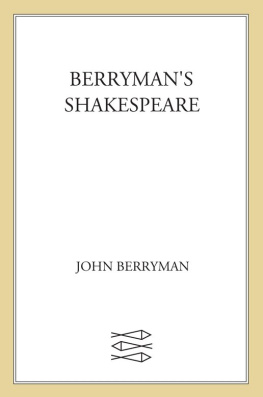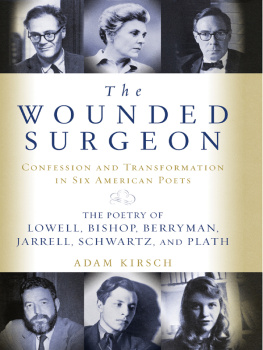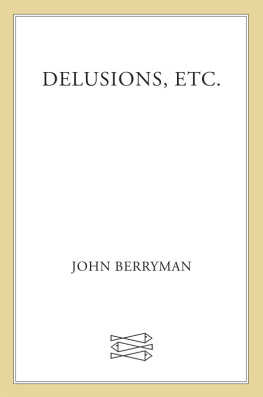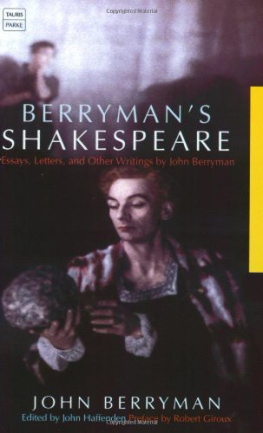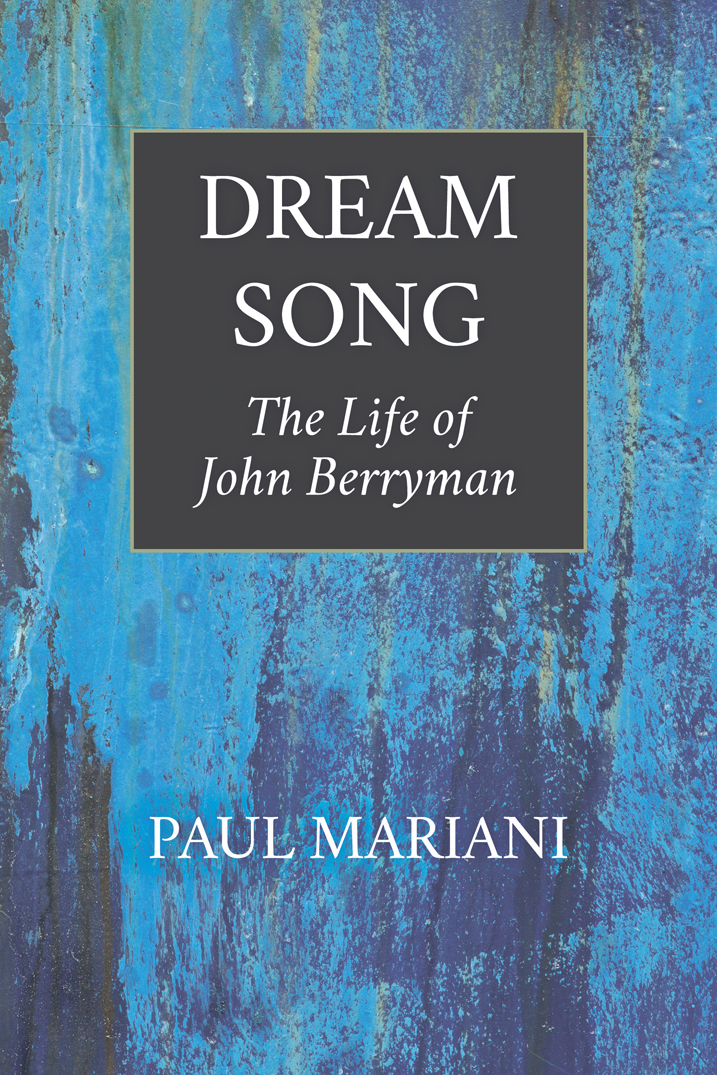
ALSO BY PAUL MARIANI
Biography
William Carlos Williams: A New World Naked (1981)
Lost Puritan: A Life of Robert Lowell (1994)
The Broken Tower: A Life of Hart Crane (1999)
Gerard Manley Hopkins: A Life (2008)
The Whole Harmonium: The Life of Wallace Stevens (2016)
Poetry
Timing Devices (1979)
Crossing Cocytus (1982)
Prime Mover (1985)
Salvage Operations: New and Selected Poems (1990)
The Great Wheel (1996)
Deaths and Transfigurations (2005)
Epitaphs for the Journey: New, Selected, and Revised Poems (2012)
Criticism
A Commentary on the Complete Poems of Gerard Manley Hopkins (1970)
William Carlos Williams: The Poet and His Critics (1975)
A Usable Past: Essays on Modern and Contemporary Poetry (1984)
God and the Imagination: Poetry, Poets, and the Ineffable (2002)
Memoir
Thirty Days: On Retreat with the Exercises of St. Ignatius (2002)

Published by Trinity University Press
San Antonio, Texas 78212
Copyright 1990 by Paul Mariani
New introduction copyright 1996 by Paul Mariani
All rights reserved. No part of this book may be reproduced in any form or by any electronic or mechanical means, including information storage and retrieval systems, without permission in writing from the publisher.
Book design by Oksana Kushnir
Cover design by Sarah Cooper
Cover image: istock.com/Joakim Leroy
ISBN 978-1-59534-767-1 ebook
Reprinted by permission of Farrar, Straus and Giroux, Inc.:
Excerpts from Delusions, Etc. by John Berryman. Renewal copyright 1969, 1971 by John Berryman. Renewal copyright 1972 by the Estate of John Berryman.
Excerpts from The Dream Songs by John Berryman. Copyright 1959, 1962, 1963, 1964, 1965, 1966, 1967, 1968, 1969, 1970 by John Berryman.
Excerpts from The Freedom of the Poet by John Berryman. Copyright 1966, renewal copyright 1972 by John Berryman. Copyright 1976 by Kate Berryman.
Excerpts from Henrys Fate by John Berryman. Copyright 1969 by John Berryman. Copyright 1975, 1976, 1977 by Kate Berryman.
Excerpts from Homage to Mistress Broadstreet by John Berryman. Copyright 1956 by John Berryman. Renewal copyright 1984 by Kate Berryman.
Excerpts from Love and Fame by John Berryman. Copyright 1970 by John Berryman.
The paper used in this publication meets the minimum requirements of the American National Standard for Information SciencesPermanence of Paper for Printed Library Materials, ANSI 39.481992.
CIP data on file at the Library of Congress
20 19 18 17 16 | 5 4 3 2 1
to the sacred memory of my mother,
Harriet Green Mariani (19231988)
Monarchs thunder from the delta floor...
and for Terrence Des Pres (19391987)
ave atque vale
Table of Contents
Guide

Contents




I am hard put to think of a poet writing in this green and ghastly century whose poems have offered me more sustained comfort and terror than John Berryman, beginning especially with The Dream Songs, with all their splendid crevices and nooks, and going on from there until the end, which came in January 1972. I include in this list not only those renegade Songs that Berryman did not allow into his gang of 385, but the others he wrote after The Dream Songs were published, some of which appeared in Henrys Fate. The Annex to Henry House, Berryman called them, and they are too delicious to be allowed to linger forever in the limbo of the out-of-print. But I want to include even those brilliant snatches of Dream Songsstanzas, linesdiscards bright as fireflies I used to find swarming inside those manuscript boxes in the Berryman collection over in St. Paul, a scant mile or three from where the creator of Henry wrote so many of them over a decade and a half of sitting down to stab his arm with his pen to commence scribbling.
Hearing Berrymans voice on the tapes he left behind over the yearshis readings at Harvard, in Washington, in lecture halls in Minneapolis, in the living room of his friends, the Thomeses (Dr. Boyd and Maris), in Ballsbridge, Dublin, in the spring of 1967 when he read for the BBC, on a double bill with Robert Lowell at the Guggenheim on Halloween 1963, shortly before the publication of the first 77, or at Brockport in 1970, when he was interviewed by Bill Heyen, who later gave me the bruised jacket Berryman somehow left behindI have listened rapt to the difficult, brilliant, hilarious creator of Henry Pussycat qua House as I would listen to a friend who over the past twenty-five years has proffered me so much pleasure.
From the years I spent assembling a life from the scattered remains of letters, poems, and interviews, I know how difficult a man John Berryman could be. He had a destiny to meet, and he operated often out on the fringes, among the sad-eyed douroucoulis and other night dwellers in complete darkness, and always on himself. He was a late starterLowell said as much in his eulogy for his old friendand he was so driven by a sense of vocation one would have thought he was out to remake twentieth-century poetry singlehandedly. Like A. E. Housman before him, he was a formidable scholar, notlike Housmanonly of Late Latin poetry, but more broadly. He was a renaissance man who knew the Renaissance. Knew his Dante, his Shakespeare and Marlowe and Jonson, his Dekker & Marston & Barnes & Day & Porter. Like Housman he too had a prescience for poetry and, friends, he worked like hell, reading and ingestingas he himself remarkedalmost everything, except, as he confessed in a late Dream Song, one book (and I suspect he read even that) Alfred Jarrys Ubu Roi:
O Henry in his youth read many things:
he gutted the Columbia & the Cambridge libraries
& Widener & Princeton
& the British Museum & the Library of Congress
but mostly he bought books to have as his own
cunningly, like extra wings....
He once interrupted two years of intense labor editing the text of King Lear to teach himself enough Italian to read Dante in the original. He learned sufficient Hebrew to translate a good chunk of Job, his favorite biblical text and the book that, along with Ralph Ellisons The Invisible Man, conspired to give him Henrys black-faced cold comforter, the one who keeps calling Henry Mr. Bones, a memento mori if ever there was one.
Like Pound before him or like Harold Bloom since, Berryman read the Western canon, then added pieces of the Eastern canon for good measure. From the time he was twelve he was as much haunted by God as Flannery OConnor herself, and he pored over Isaiah and the Gospels (Mark in particular), as well as the Church Fathers, Augustine, Brother Martin, / St. Simeon the Lesser Theologian, Bodhidharma, and the Baal Shem Tov. He brooded over the prophet Amos and Pascal, Kierkegaard and Wittgenstein, Wellisch and Bishop Westcott. He spoke brilliantly on Whitman and Stevens and the two Cranes, and their various contributions to the American poetic endeavor. He brooded on Bishop and Plath and Dickinson and the two Annes, Frank and Bradstreet (the last of whom he felt obliged to note was not,


